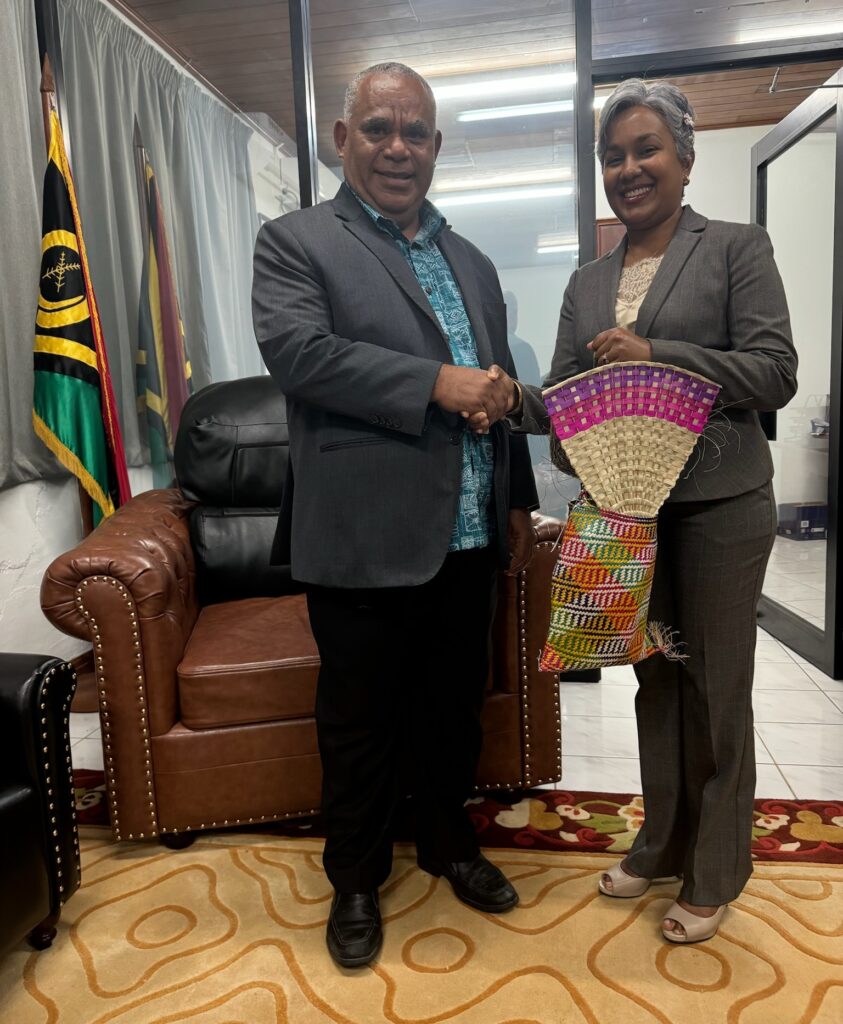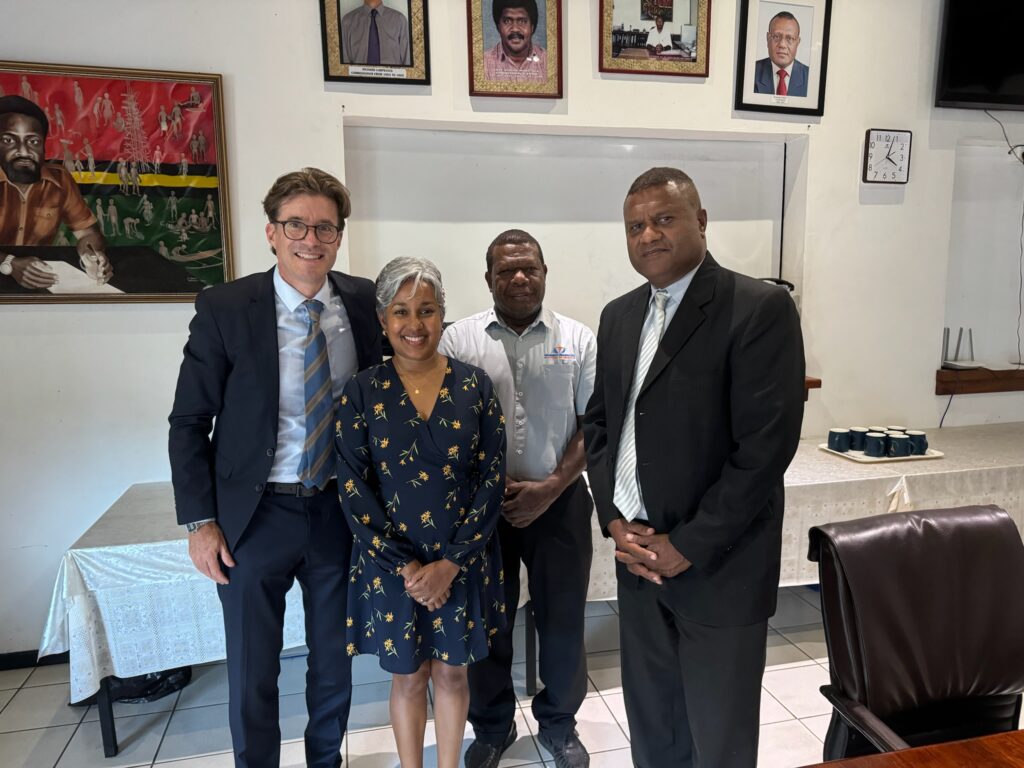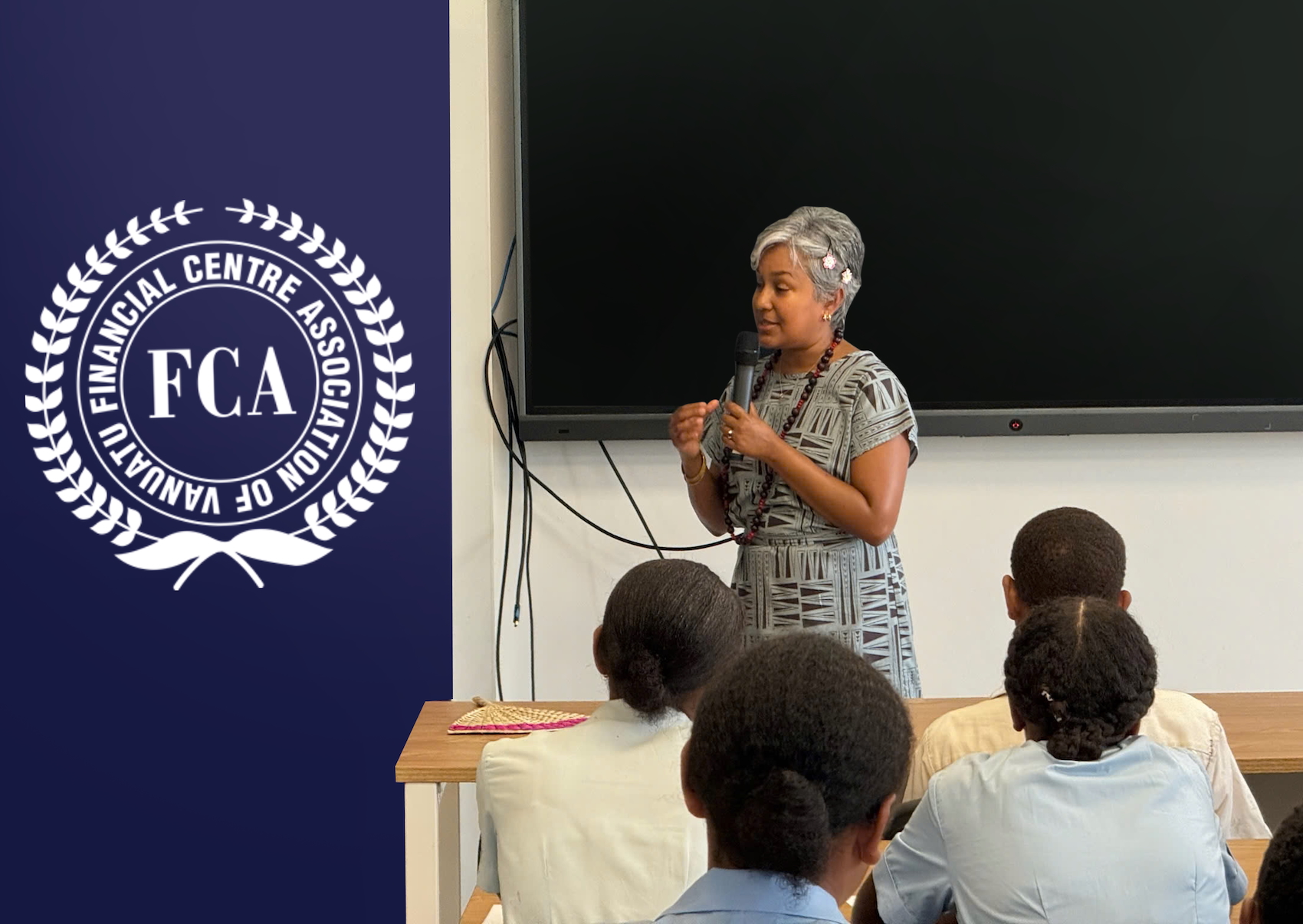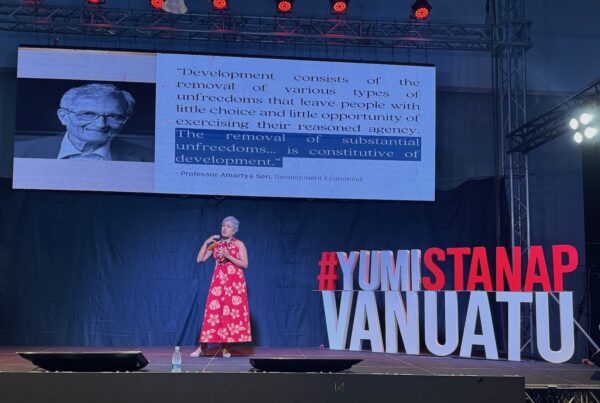Caribbean economist Marla Dukharan visited Vanuatu this month, sharing her expertise in a series of interviews with the Daily Post’s Ezra Toara. She discussed the country’s economic landscape, the social impacts of seasonal worker programs, and the critical role of regional air connectivity. Below, we’ve compiled three of Toara’s articles featuring her insights.
Economist says Vanuatu’s economic situation not as severe as perceived
The economic situation in Vanuatu is not as severe as some may think, says Marla Dukharan, a Caribbean economist and leading advisor on regional economic policy.
Speaking on Vanuatu’s current economic outlook, Dukharan noted that while inflation and unemployment are concerns, they do not lead to the kind of deep social problems seen in some other small island nations. Drawing comparisons with her home region, she stated:
“I come from countries where the debt-to- Gross Domestic Product (GDP) ratio is 150%, unemployment is at 30%, and poverty affects up to 50% of the population. In comparison, Vanuatu is doing relatively well,” she said.

Dukharan explained that while it is fair to say that Vanuatu faces economic challenges such as high inflation and limited employment opportunities, these issues are not necessarily leading to widespread social distress.
“It’s one thing to say we have an economic problem, but none of it really matters unless it becomes a social problem — and I don’t believe that’s the case in Vanuatu,” she said.
The economist pointed out the strength of Vanuatu’s traditional and community-based systems. She explained that, in contrast to the Caribbean where losing a job may push someone to the poverty line, in Vanuatu, individuals who lose employment often return to their villages and continue living within a communal, subsistence-based system.
“In Vanuatu, you don’t become homeless or impoverished in the same way. There is a strong indigenous economic and cultural structure that works more effectively than formal social welfare systems,” she said.
She further mentioned that Vanuatu’s communities already practice a form of social protection through mutual support and communal care. “People here look after one another. That’s why I don’t believe Vanuatu faces the same kinds of socially-driven economic problems that other small island developing states are grappling with.”
Referring to the Caribbean experience during COVID-19, Dukharan noted that many governments in her region struggled to measure poverty accurately, and the economic fallout was widespread. In Vanuatu, she said, measuring poverty in the same way may not be meaningful, as people are not facing hunger on a large scale.
“As far as I can see, Vanuatu’s economy is doing okay. Of course, there’s always room for improvement — especially with the rising cost of living, inflation, and utility prices. But overall, the fundamentals are not alarming.”

She cautioned, however, that Vanuatu remains vulnerable to natural disasters, which can quickly impact economic stability. “The real challenge lies in how we prepare for and manage disasters. We need to think about building homes and infrastructure in ways that are resilient — perhaps even drawing from traditional architectural practices.”
Dukharan also acknowledged that both internal and external factors, including blacklisting by international bodies, influence Vanuatu’s economic outlook. Despite these challenges, she concluded that Vanuatu is “economically doing quite well” relative to many other small island nations.
Seasonal work abroad brings economic hope, but social costs
Caribbean economist and leading regional economic policy advisor Marla Dukharan has drawn attention to the complex effects of labour mobility programmes such as seasonal work schemes, which are increasingly appealing to young people in developing nations like Vanuatu.
“With seasonal work, young people naturally want to go where the opportunities are—where they can earn and save money to build a home, invest in a business, and support their families,” Dukharan said. “How can you tell people not to take up an opportunity when it exists?”
However, she warned of deeper, long-term social consequences. “There’s also an element of brain drain in this trend. In the Caribbean, we’ve seen similar issues. The countries that need migrant labour—whether temporary or seasonal—will continue to make these programmes attractive to workers,” she said.
Dukharan noted that the appeal of such work could lead many to rely solely on overseas employment. “I don’t know what the solution is, but hearing people talk about it is a good starting point,” she added.
She also pointed out that new migration policies allowing workers to take their families abroad could further affect national economies. “If workers are no longer sending money home, it reduces the revenue flowing back to the country. That could weaken the very economy people are leaving behind. It’s like ripping your own people away when what you actually want is to build and strengthen your country.”
Dukharan said Caribbean nations are facing similar challenges. “It’s easy to say we should create more opportunities at home, but maybe we just haven’t been creative enough. Remittances help, yes—but that’s not the kind of opportunity people truly need,” she said. “It’s a real challenge: you want people to have economic opportunities, but you also want to avoid the social costs of large-scale migration. And there’s no simple solution.”
Airlift vital for more than tourism, says Caribbean Economist
While aviation and tourism are two distinct sectors, they remain deeply interdependent, says Marla Dukharan, a Caribbean economist and leading advisor on regional economic policy.
Speaking on the importance of connectivity in island economies like Vanuatu, Dukharan noted that tourism exists in virtually every country—from the most isolated to some of the wealthiest, including destinations like Dubai. However, she called for a focus on sustainable tourism models.
“In the Caribbean, cruise tourism hasn’t always been beneficial. While tourists generally spend money, cruises tend to offer limited engagement—passengers may only stay for a few hours or overnight, which doesn’t give them a chance to fully experience the local culture,” she explained.
Dukharan stated that aviation is more than just a pillar of tourism—it’s essential to economic growth, connectivity, and resilience. She cited research by the International Monetary Fund (IMF), which found that airlift—the availability and frequency of flights—plays a major role in the performance of the tourism sector in the Caribbean.
“Airlift is not only about tourism. It’s also critical for business, education, investment, and family connections. People from across the Pacific move to Vanuatu for work, study, or to reunite with loved ones. Without reliable air connections, all of that is affected,” she said.
The economist also called for ensuring long-term sustainability in the aviation sector. While she doesn’t necessarily support keeping a loss-making national airline afloat indefinitely, she believes strategic reforms are needed.
“We need to prioritise the airline’s role in national development—but perhaps look at involving a private operator who can make it profitable. Fees must be sensible and competitive, especially when compared to other regional carriers.”
Dukharan added that airlift has broader implications beyond tourism. “It’s essential for disaster response—bringing in supplies and evacuating the injured—and it supports multiple sectors. That’s why airlift is so critical for small island economies like Vanuatu.”





